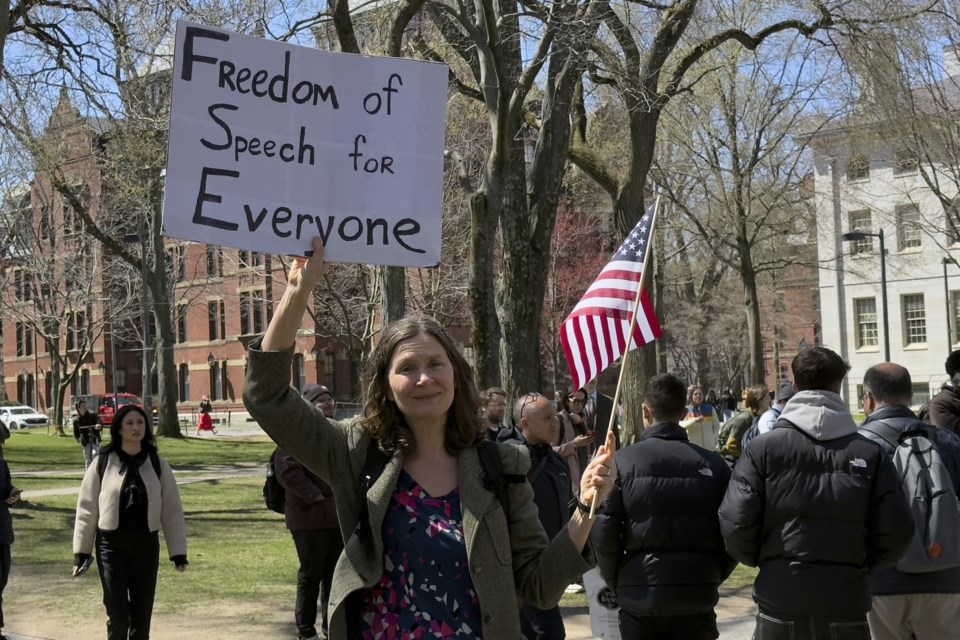CAMBRIDGE, Mass. (AP) — University professors and students led protests on campuses across the U.S. on Thursday against what they say are broad attacks on higher education, including massive cuts to funding, the expulsion of international students and the stifling of free speech about the war in Gaza.
Demonstrations were held at schools including Harvard, where President Donald Trump's administration says it will freeze $2.2 billion in grants and contracts and is threatening to revoke the university’s ability to host international students.
Rochelle Sun, a graduate student at Harvard's Department of Government, said she came to stick up for international students because they're integral to the school's mission of pushing “the boundaries of human knowledge.”
“The whole point of me having this education here and for pursuing research at Harvard is to be among the best scholars that exist in the world,” Sun said after the protest in Cambridge, Massachusetts. “And so if they’re not going to be around me, then I’m not going to be able to achieve my goals of being here, either.”
Sun held a sign that read: “I should be writing my dissertation, but I keep having to fight this stupid fascism.”
Nancy Krieger, a professor of social epidemiology in Harvard's School of Public Health, spoke to the crowd about cuts to programs that are crucial to medical discoveries and monitoring the health of the population.
“We are doing our work to make a better world in which all living on this planet can equitably thrive,” she said.
Krieger said her grant from the National Institutes of Health was terminated in late February because it studied discrimination in health, the kind of research that likely won't be funded by companies or philanthropies.
“We need to have that money going towards research and academic work and the training and teaching of the next generation that can protect the public's health,” Krieger said to cheers.
Federal funding targeted
A growing list of higher education institutions have had federal funding targeted by the government in an effort to get the institutions to comply with the Trump administration’s political agenda. The series of threats — and subsequent pauses in funding — to some of the top U.S. universities have become an unprecedented tool for the administration to exert influence on college campuses.
Trump vowed to pursue these federal cuts on the campaign trail last year, saying he would focus on schools that push “critical race theory, transgender insanity, and other inappropriate racial, sexual, or political content.”
Republican officials have also heavily scrutinized universities where Palestinian protests erupted on campus amid the war in Gaza last year, while several Ivy League presidents testified before Congress to discuss antisemitism allegations.
Trump and other officials have accused protesters and others of being “pro-Hamas,” referring to the Palestinian militant group that attacked Israel on Oct. 7, 2023. Many protesters have said they were speaking out against Israel’s actions in the war.
The U.S. government this year has used its immigration enforcement powers to crack down on international students and scholars who participated in pro-Palestinian demonstrations or criticized Israel over its military action in Gaza. Some have been taken into custody or deported. Others fled the U.S. after learning their visas had been revoked.
Ronald Cox, a professor of political science and international relations at Florida International University in Miami, said during a small event Thursday that the international students are fearful.
“They don’t know if they could be deported, they don’t know if they can be directed to the El Salvadoran prison," Cox said. "There’s been no due process. It’s kind of open season on the most vulnerable students.”
‘You cannot appease a tyrant’
Thursday's protest at Harvard comes just a few days after it became the first university to openly defy the Trump administration as it demands sweeping changes to limit activism on campus. The university frames the government’s demands as a threat not only to the Ivy League school but to the autonomy that the Supreme Court has long granted American universities.
Meanwhile, roughly 450 people showed up for a protest at the University of California-Berkeley, where emeritus professor and former Labor Secretary Robert Reich spoke out against placating Trump.
“You cannot appease a tyrant," said Reich, who served in President Bill Clinton's cabinet. "Columbia University tried to appease a tyrant. It didn't work."
Columbia University in New York initially agreed to several demands from the Trump administration. But its acting president took a more defiant tone in a campus message Monday, saying some of the demands “are not subject to negotiation.”
About 150 protesters rallied at Columbia, which had been the scene of huge pro-Palestinian protests last year. They gathered on a plaza outside a building that houses federal offices, holding signs emblazoned with slogans including “stop the war on universities" and “censorship is the weapon of fascists.”
The protests were organized by the Coalition for Action in Higher Education, which includes groups such as Higher Education Labor United and the American Federation of Teachers.
Kelly Benjamin, a spokesperson for American Association of University Professors, said in a phone call that the Trump administration's goal of eviscerating academia is fundamentally anti-American.
“College campuses have historically been the places where these kind of conversations, these kind of robust debates and dissent take place in the United States,” Benjamin said. “It's healthy for democracy. And they’re trying to destroy all of that in order to enact their vision and agenda.”
___
Finley reported from Norfolk, Virginia. Associated Press journalists Noah Berger in Berkeley, California, Joseph B. Frederick in New York, and Daniel Kozin in Miami contributed to this report.
Rodrique Ngowi And Ben Finley, The Associated Press



